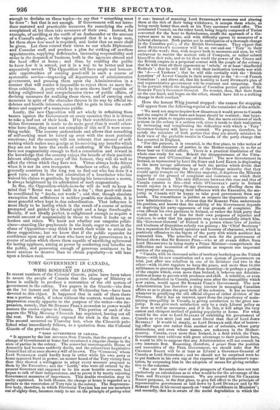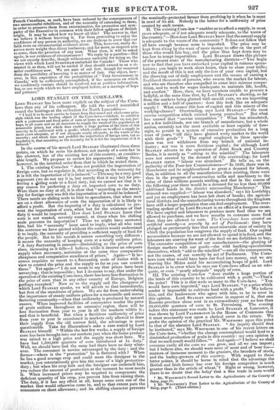TORY GOVERNMENT IN CANADA, AND WHIG ROGUERY IN LONDON.
Ix recent numbers of the Colonial Gazette, pains have been taken to assure the people of Canada that the change of Ministry at home is unlikely to produce a restoration of the old system of government in the colony. Two papers in the Gazette—the first on the 1st instant and the other on Wednesday last—have been devoted to this object. It happened that in each of them there was a portion which, if taken without the context, would leave an impression exactly opposite to the purpose of the writer—the im- pression, namely, that Sir Rom= PEEL'S accession to power would restore the ancien regime in Canada. This portion of each of the papers the Whig Morning Chronicle has reprinted, leaving out all the rest. We have already exposed the trick in the first case. The second occurred on Thursday last, when the Chronicle pub- lished what immediately follows, as a quotation from the Colonial Gazette of the previous day.
"TORY GOVERNMENT IN CANADA.
"It appears by the last accounts from Canada, that the prospect of a change of Government at home had occasioned a singular change in the state of parties in the colony. The somewhat unmanageable House of Assembly had become suddenly docile, and the subservient Legislative Council had all at once shown a will of its own. The Commons,' whom Lord SvnErmsx could hardly keep in order while his own party at home appeared fixed in power, no sooner heard of the Tory victory here than they showed a willingness to adopt every measure proposed to them by the Executive ; and the Lords,' who were all created by the present Governor and supposed to be his most humble servants, had begun to talk of their independence, and to prove it by nearly rejecting Government measures of importance. This double revolution may be easily explained. In both Houses, the change at home is regarded as a prelude to the restoration of Tory rule in the colony. The Representa- tive body, therefore, in which Provincial Toryism has not ten members out of eighty-four, becomes ready to act on the principle of getting what it can: instead of scanning Lord Sri:minuses measures and altering them at the risk of their being withdrawn, it accepts them whole, as being surely better than such as his Tory successor would offer. The nominated Council, on the other hand, being largely composed of Tories converted for the hour to Sydenhamism, snuffs the approach of a Go- vernor more to its taste, and with difficulty agrees to measures of a Liberal character. Both parties act in anticipation of a thorough change in the Canadian po1ic3 of the British Government. They expect that Lord SYDENHAM'S successor will be an out-and-out Tory ' in their sense of the word ; that, with respect both to measures and men, he will endeavour to restore the ancient rule of Compacts, or rather submit himself to their rule, and so let them wield the power of the Crown and the British empire in a perpetual contest with the people of the colony; that he will treat all their opponents as rebels,' or at least disaffected Radicals ' ; that be will fall in with their inclination towards war with the 'd—d Yankees ' ; that he will side cordially with the British Loyalists' of Lower Canada in their animosity to the'd--d French Canadians ' ; and above all, that his hostility to Lord DURHAM'S plan of real representative government will be constant and unsparing. Such is the portrait which the imagination of Canadian parties paints of Sir ROBERT PEEL'S Governor-General. No wonder, then, that their fears on the one hand, and hopes on the other, should have led to a striking change in their conduct.'
Here the honest Whig journal stopped : the reason for stopping will appear from the following reprint of the remainder of the article.
"We need not stop to inquire how disastrous it would prove to Canada and the empire if these fears and hopes should be realized; that hypo- thesis is too plain to require exposition. But the mere existence of such notions in the colony is a serious evil, since it tends to their realization by increasing and complicating the difficulties with which a 'Tory' Governor-General will have to contend. We propose, therefore, to satisfy the colonists of both parties that they are utterly mistaken in their view of the probable results in Canada of the party change that has occurred in England.
"For this purpose, it is essential, in the first place, to take notice of the state and character of parties in the Mother-country, in so far as these bear on Colonial affairs. There is a practical illustration of the whole case ready for use. Behold the disappointment of the Ultra- Orangemen and O'Connellites of Ireland ! The new Government in Ireland, as represented by Lord De GREY and Lord ELIOT, is displeasing to the more savage adherents of both the parties which divide that country. By frustrating the hope of the Orange minority that they should again trample on the Milesian majority, it deprives the Milesian majority of the ground of complaint and resistance on which their leader had counted. The only difference between this case and that of Canada consists in this—that while O'ConNELL's party in Ireland would rejoice in a bitter Orange Government as affording them the best prospect of recovering their influence with the Executive, the ma- jority in Canada will be happy to take good government from any hands. The resemblance is perfect as respects the disposition of the new Administration it is obvious that Sir ROBERT PEEL understands his position, and knows that the stability of his Government depends on depriving his party-opponents of real grounds of complaint. He even offends his own partisans in Ireland, or rather the Irish party that would make a tool of him for their own purposes of injustice and violence, in order that his opponents may not successfully attack him. His 'Governor-General' of Ireland is a person whose love of justice and kindness of disposition nobody can gainsay ; his Chief Secretary' has a reputation for Liberal opinions and honesty of character, which is positively offensive to the bigots of the party with which accident has connected him. The selection of such men for the government of Ireland shows that Sir lionnux PEEL—who at all events differs from Lord MELBOURNE in being really a Prime Minister—comprehends the difficulties and necessities of his position as respects one important portion of the empire. "Canada, with its thousand miles of territory bordering on the United States—with its new constitution and a new system of government on trial, just after one rebellion in one of its divisions and two in the other—with 16,000 regulars to keep the peace, and more than 16,000 militiamen to prevent the regulars from deserting—is perhaps a portion of the empire which, even more than Ireland, it behoves any Adminis- tration at home to govern with prudence and skill. A rebellion, or even general disaffection in Canada, coming soon after the tranquillity which now exists, would upset Sir ROBERT PEEL'S Government. The new Administration has therefore a deep interest in managing Canadian affairs so as to please the great bulk of the colonists. It has no interest whatever in gratifying the old official cliques of either division of the Province. But it has an interest, apart from the expediency of main- taining tranquillity in Canada, in giving satisfaction to the great ma- jority. It can give such satisfaction only by a truly Liberal policy as to men as well as measures; and if it do this, it will adopt the very easiest and cheapest method of gaining popularity at home. For what would be the cost to Lord STANLEY of exhibiting his government of Canada as even more just and more liberal than that of Lord Joins RUSSELL? It would be simply, as Lord Dualism said, that of bestow- ing office upon one rather than another set of colonists, whose party distinctions, and even whose names, are unknown in the Mother- country. Canada, even more than Ireland, is a field which the PEEL Government may cultivate with great advantage to their position here, It would be idle to suppose that any Administration will not consult its own interests first. Reasoning, therefore, 41 priori from the position and necessities of the PEEL Government, we should infer that Sir CHARLES BAccrr will be at least as Liberal a Governor-General of Canada as Lord SYDENHAM ; and we should not be surprised were he to put feathers in his own cap at the expense of his predecessor's repu- tation, by surpassing him in the adoption of means for giving satisW- don to the colonists.
"But our favourable view of the prospects of Canada does not rest exclusively on calculations as to what would be for the advantage of the PEEL and STANLEY Government. We are assured that Sir CHARLES Beoox purposes, in the first place, to give full effect to the principle of representative government as laid down by Lord DURHAM and by Sir ROBERT PEEL in his recent speech on 'want of confidence in Ministers ' ; and secondly, that he is aware of the social degradation to which the
French Canadians, as such, have been reduced by the consequences of two unsuccessful rebellions, and of the necessity of extending to them, in order to preserve them from extermination, the protection and sym- pathy of the Executive in common with their fellow-s.pbjects of British origin. It may be asked how we know all this ? The answer is, that we believe it without knowing it. Far from pretending to enjoy the confidence of any person in authority, we are desirous to avow that our faith rests on circumstantial evidence alone. This, however, really de- serves more weight than direct testimony, and far more, as respects acts to come, than the promises of any man. What then, it will be asked again, is our evidence of circumstances ? We reply by a question—Did we not exactly describe, though without any authority for doing so, the views with which Lord SYDENHAM embarked for Canada? Those who trusted in us then, will not be misled if they should extend to us a si- milar confidence now. We are sure of our fact, though far removed from the possibility of knowing it as matter of fact. Our object, how- ever, in this exposition of the probabilities of 'Tory Government in Canada,' will be sufficiently accomplished, if the assurance on which we confidently venture should be received not as positive information, but, to use words which we have employed before, as a message of hope and patience."



























 Previous page
Previous page